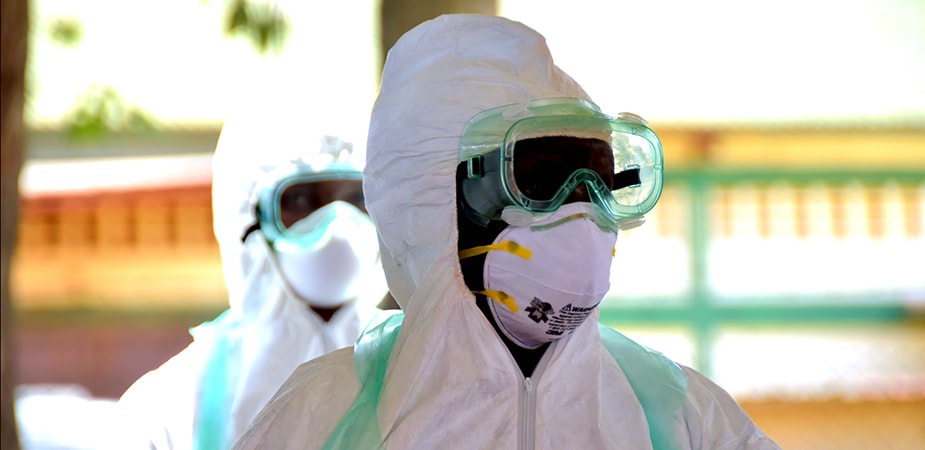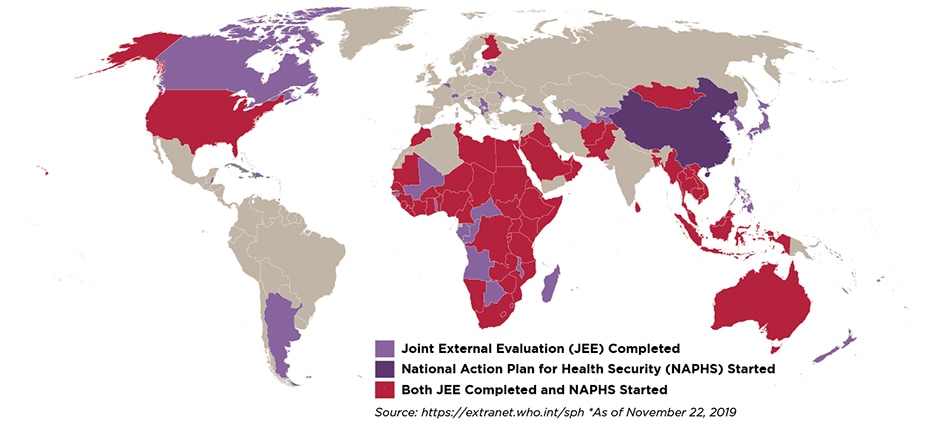Raising Visibility for Global Health Security
December 9, 2019

Ebola simulation exercise in Uganda prepared responders to quickly identify the first cross-border Ebola case in June 2019. Photo: Irene Nabusoba
Almost two-thirds of countries lack effective health security: the ability to prevent, detect, and respond to infectious disease outbreaks. In an increasingly interconnected world, threats to global health security pose a serious risk to lives at home and abroad.
During frightening emergencies like the 2014-2016 West Africa Ebola epidemic, partners and donors are often eager to help other countries in need. Unfortunately, when the emergency ends, attention to health security and resources decrease and countries are challenged with sustaining improvements. As a result, progress made is often lost.
Partner support is critical to help countries transition from emergency response to routine public health activities that build and sustain health systems. CDC actively works with countries, strengthening their capabilities to identify, track, and stop outbreaks and public health emergencies as quickly as possible.
Assessing Critical Gaps in Health Security
One new resource that countries can use to leverage partner support and sustain health security investment is the World Health Organization’s (WHO) International Health Regulations Monitoring and Evaluation Framework (IHR MEF). This toolkit enables countries to assess preparedness strengths and weaknesses, identify gaps and prioritize areas for improvement.
The IHR MEF is unique—it helps a ministry of health maintain high-level government attention on health security, attracting additional resources and targeting existing resources toward priority needs. CDC has been pivotal to the success of the IHR MEF by working with WHO to create and improve this toolkit, in addition they have deployed experts to help countries use the tools.
An All-of-Government Priority
One tool within the IHR MEF, the Joint External Evaluation (JEE), assesses a country’s health security capabilities. This voluntary process brings together representatives from across a country’s government, including leaders and technical experts from animal and human health, agriculture, defense, and finance. In this way, the JEE encourages coordinated solutions to health security problems.
Through the JEE, Nigeria and Uganda made health security an all-of-government priority, rather than just a health sector responsibility. In Nigeria, the JEE brought national-level attention to the Nigeria Centre for Disease Control (NCDC), paving the way for a presidential act empowering the NCDC to direct state and federal level public health actions. Uganda leveraged extra attention from its JEE and follow-up plans to integrate health security into its National Development Plan III, cementing it as a long-term priority for the government.
The Blueprint for a Safer World
Following a JEE, many countries develop National Action Plans for Health Security (NAPHS), incorporating activities to more effectively address health emergencies. Countries also use these plans to direct potential partners to the most critical activities needing additional resources.
For example, Uganda secured $1.4 million U.S. dollars from the private and non-profit sectors to build the country’s public health workforce capacity. Some of these funds were used to train Ugandan disease detectives, helping them track outbreaks at the source and stop diseases from further spreading. This training recently helped prevent Ebola from spreading along Uganda’s border with the Democratic Republic of Congo, the epicenter of the current Ebola epidemic.
“Prioritizing a sustained, focused commitment to health security is a prerequisite for the development of our nation. It’s vital to saving lives, spending wisely, and protecting our economy.”
— Hon. Ruhakana Rugunda, Prime Minister of Uganda
Sierra Leone worked with external partners to develop an annual NAPHS and JEE assessment update. This level of engagement helped funders more clearly understand the country’s resource needs and provide guidance for external funds to address these gaps. By shifting focus to Sierra Leone’s priorities for health security, it is more likely that the government will maintain this momentum, aligning domestic resources to continue to build and sustain capacity.
CDC is committed to supporting the IHR MEF because it brings health security into the spotlight, taking it from a ministry of health responsibility to an all-of-government priority. With IHR MEF, countries obtain international investments and increase their own budgeted resources to address health security gaps for years to come, making each country—and the world—safer.
Country Progress with the JEE and NAPHS

- The Joint External Evaluation (JEE) Process: A Project to Assess and Build Global Health Security, July 2019
- Venezuela Crisis Presents Complex Global Health Security Challenges, Spring 2019
- JEEs: Charting the Course for Global Preparedness, Winter 2017
- Global Response Preparedness Work in Jordan, Winter 2016
- Joint External Evaluation, Winter 2016